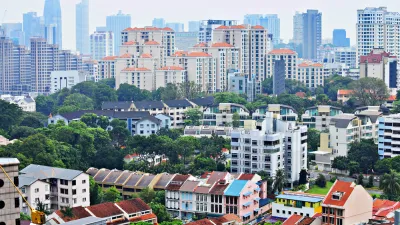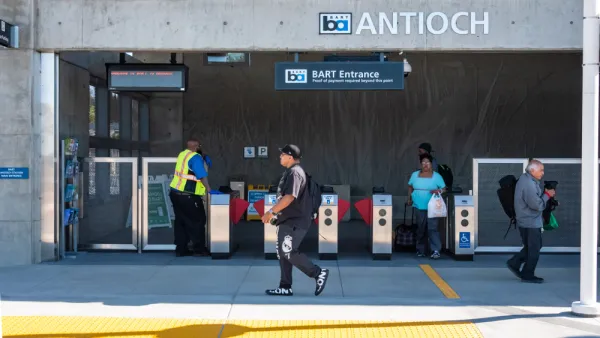For urbanists who have reduced their carbon footprints by driving less and living more densely in smaller homes, researchers from UC Berkeley have some bad news. Your reduced emissions are canceled out by those in the suburbs ringing your city.

"People in the densely populated cores of big cities are responsible for less greenhouse gas emissions, but the more carbon-intensive lifestyle of their far-flung suburbs cancels out any of the benefits, researchers at UC Berkeley found," writes Tony Barboza.
“The affluent suburbanites that commute long distances more than make up for the low-transportation footprint of urban dwellers,” said Daniel Kammen, a professor of energy at UC Berkeley [and co-author of the study "funded by the National Science Foundation and the California Air Resources Board; published in the journal Environmental Science & Technology."]
That is not to discount the lesser impact of city-dwellers who can have "a 50% smaller carbon footprint than a similar-sized family in a distant suburb," writes Barboza.
Stephanie M. Lee of the San Francisco Chronicle also writes about the study, providing examples from San Francisco neighborhoods and its Bay Area suburbs.
Increasing population density in cities reduces emissions - but only to a point before the savings aren't that substantial and quality of life begins to suffer, said Kammen, who worked on the study with doctoral candidate Christopher Jones.
Check out your carbon footprint by zip code with these interactive maps.
FULL STORY: Carbon footprint maps reveal urban-suburban divide

National Parks Layoffs Will Cause Communities to Lose Billions
Thousands of essential park workers were laid off this week, just before the busy spring break season.

Retro-silient?: America’s First “Eco-burb,” The Woodlands Turns 50
A master-planned community north of Houston offers lessons on green infrastructure and resilient design, but falls short of its founder’s lofty affordability and walkability goals.

Delivering for America Plan Will Downgrade Mail Service in at Least 49.5 Percent of Zip Codes
Republican and Democrat lawmakers criticize the plan for its disproportionate negative impact on rural communities.

Test News Post 1
This is a summary

Test News Headline 46
Test for the image on the front page.

Balancing Bombs and Butterflies: How the National Guard Protects a Rare Species
The National Guard at Fort Indiantown Gap uses GIS technology and land management strategies to balance military training with conservation efforts, ensuring the survival of the rare eastern regal fritillary butterfly.
Urban Design for Planners 1: Software Tools
This six-course series explores essential urban design concepts using open source software and equips planners with the tools they need to participate fully in the urban design process.
Planning for Universal Design
Learn the tools for implementing Universal Design in planning regulations.
EMC Planning Group, Inc.
Planetizen
Planetizen
Mpact (formerly Rail~Volution)
Great Falls Development Authority, Inc.
HUDs Office of Policy Development and Research
NYU Wagner Graduate School of Public Service





























